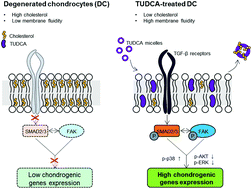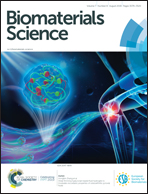Tauroursodeoxycholic acid (TUDCA) counters osteoarthritis by regulating intracellular cholesterol levels and membrane fluidity of degenerated chondrocytes†
Abstract
Cholesterol and lipid metabolism are associated with osteoarthritis (OA) in human cartilage. High cholesterol levels in OA chondrocytes leads to decreased membrane fluidity and blocks the signaling cascade associated with the expression of chondrogenic genes. It is known that bile acid plays a role in regulating cholesterol homeostasis and the digestion of fats in the human body. Tauroursodeoxycholic acid (TUDCA), as a member of the bile acid family, also aids in the transport of cellular cholesterol. In this study, we hypothesized that TUDCA might be able to promote the restoration of OA cartilage by reducing membrane cholesterol levels in OA chondrocytes and by stimulating the chondrogenic signaling cascade. To assess this hypothesis, we investigated the effects of TUDCA on degenerated chondrocytes isolated from patients with OA. Importantly, treatment with TUDCA at sub-micellar concentrations (2500 μM) significantly increased cell proliferation and Cyclin D1 expression compared with the controls. In addition, the expression of chondrogenic marker genes (SOX9, COL2, and ACAN), proteins (SOX9 and COL2), and glycosaminoglycan (Chondroitin sulfate) was much higher in the TUDCA-treated group compared to the controls. We also found that TUDCA treatment significantly reduced the intracellular cholesterol levels in the chondrocytes and increased membrane fluidity. Furthermore, the stability of TGF receptor 1 and activity of focal adhesion proteins were also increased following TUDCA treatment. Together, these results demonstrated that TUDCA could be used as an alternative treatment for the restoration of OA cartilage.



 Please wait while we load your content...
Please wait while we load your content...